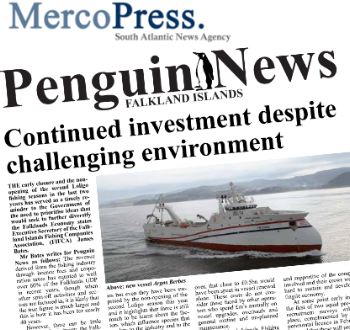|

Photo: PenguinNews/FIS
Continued Investment Despite Challenging Environment
 FALKLAND ISLANDS
FALKLAND ISLANDS
Friday, December 06, 2024, 20:00 (GMT + 9)
The early closure and non-opening of the second Loligo fishing season in the last two years has served as a timely reminder to the Government of the need to prioritize ideas that would seek to further diversify the Falklands economy, states James Bates, Executive Secretary of the Falkland Islands Fishing Companies Association (FIFCA).
Mr. Bates writes for Penguin News as follows:
 FIS Seafood Media.png) The revenue derived from the fishing industry through license fees and corporation taxes has equated to well over 60% of the Falklands' GDP in recent years. Though when other spin-off activities and sectors are factored in, it is likely that the true figure is much larger — this is how it has been for nearly 40 years. The revenue derived from the fishing industry through license fees and corporation taxes has equated to well over 60% of the Falklands' GDP in recent years. Though when other spin-off activities and sectors are factored in, it is likely that the true figure is much larger — this is how it has been for nearly 40 years.
However, there can be little doubt that the industry, the Falklands Islands Government, and by extension the whole community, have now entered unprecedented and uncertain times. There is a real sense of caution regarding the second Loligo season in particular for 2025, which is full of unknowns and whose outcome we are unlikely to know the certainty of until at least August next year.
Whilst some work is currently being undertaken to try and better understand the environmental factors that led to the failed seasons of the squid fishery over the last two years, it is crucial to ensure that there is little cause for optimism for 2025 without clear evidence and experience on how these issues might evolve.
Three Purpose-Built Fishing Vessels
However, and despite the significant recent setbacks and additional costs, the sector recognizes that the fishing industry has a responsibility to continually modernize and evolve within their industry. There is no clearer or more visible demonstration of this than the replacement of some older vessels with state-of-the-art fishing vessels.
.png) 2024 alone has seen the launching and handing over of no less than three purpose-built fishing vessels at a combined cost in excess of £100 million. These vessels, which are fully funded and include clear construction costs, have been handed over. Close to £0.5 billion has been spent on vessel renewal alone. 2024 alone has seen the launching and handing over of no less than three purpose-built fishing vessels at a combined cost in excess of £100 million. These vessels, which are fully funded and include clear construction costs, have been handed over. Close to £0.5 billion has been spent on vessel renewal alone.
These costs do not consider those faced by other operators, who spend millions annually on vessel upgrades, overhauls, general maintenance, and unexpected repair routines.
Looking Forward
The Falkland Islands Fishing Industry operates 365 days a year and is an extremely resource-intensive environment to operate within. When we see vessels in the harbor—either transshipping or collecting licenses—they should be collectively proud and supportive of the companies involved and their crews working hard to sustain and develop our fragile economy.
At some point early in 2025, the first of two squid pre-season recruitment surveys will take place, complemented by an experimental license in February. It is hoped these efforts will provide an indication of how the year may unfold and that 2025 will prove to be better than 2024—for the benefit of all, particularly those with newer vessels.
Source: Penguin News/ MercoPress
[email protected]
www.seafood.media
|



